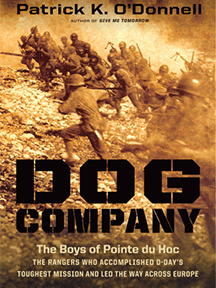By Benjamin Franklin Martin
Heroism is always in short supply, yet heroes must step forward. The success of the Normandy landings on D-Day depended in large measure on silencing the six 155mm guns atop the Pointe du Hoc with which the Germans could rake the beaches below. The assignment fell to the 2nd Ranger Battalion, commanded by Lt. Colonel James Earl Rudder. Its Company D—“Dog Company”—took on the seemingly suicidal mission of climbing the ninety-foot cliff face against machinegun fire and grenades. Although the battalion suffered nearly 60 percent casualties during the combat of June 6-8, 1944, they destroyed the 155s and completely disrupted German communications. Dog Company 1st Sergeant Leonard G. Lomell singlehandedly disabled five of the guns—for which he has been called second only to Supreme Allied Commander General Dwight D. Eisenhower in importance to the success of the D-Day invasion.
Formed in March 1943, the 2nd Ranger Battalion trained in the backwoods of Tennessee and the swamps of Florida, frequently enduring speed marches of more than thirty miles with minimal food and water. After a stormy Atlantic crossing to Great Britain, they practiced for their D-Day mission on the cliffs at Cornwall. There, carrying sixty pounds of gear and without safety harness, they learned to climb sheer rock as much as 400 feet high while dodging live rounds fired near them to simulate combat conditions. Even so, what they confronted at Pointe du Hoc required courage of the highest order.
Three months later, in September 1944, the Rangers played a pivotal role in forcing the German surrender at the critical Breton port of Brest. Afterward, they were sent north to the Hürtgen Forest campaign in western Germany, where Allied forces had already suffered 40,000 casualties. On December 7, 1944, caught in a mortar barrage and facing a much larger enemy force, Dog Company seized the strategic high ground of the region, Hill 400, when they surprised the Germans by charging with fixed bayonets. They then successfully resisted counterattacks for more than twenty-four hours until reinforcements could consolidate the position.
To recount this bravery, Patrick K. O’Donnell has relied upon the after-action reports that now rest at the National Archives and Record Administration, heavily supplemented by the oral testimony he has gathered during extensive interviews with veterans since 1995. The combination produces a narrative that is powerful, immediate and poignant. The men of Dog Company richly deserve this remembrance of their valor.
Benjamin Franklin Martin (ΦBK Davidson College, 1969) is the Price Professor of History at Louisiana State University and a resident member of the Beta of Louisiana chapter of Phi Beta Kappa.




